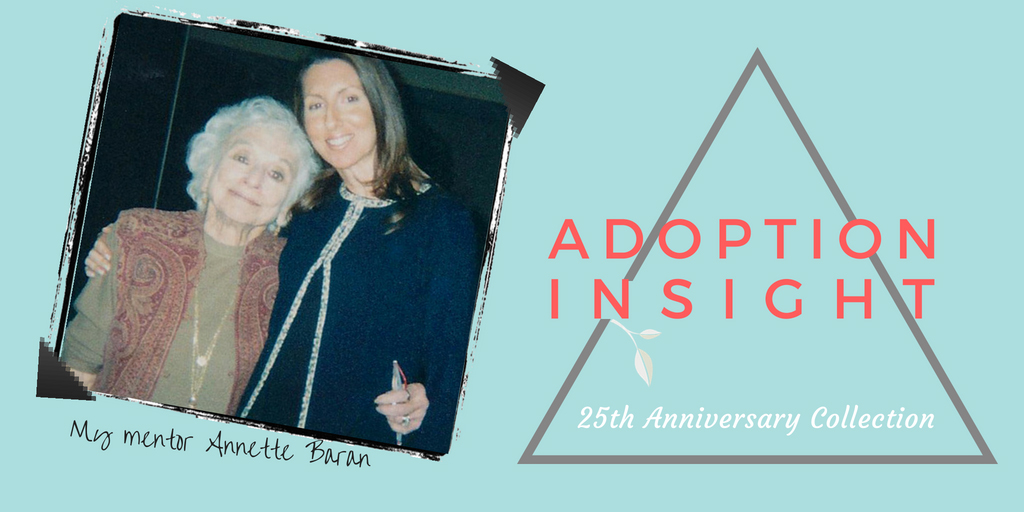
Of all the articles I wrote about adoption, this remained one of my favorites. In a short piece it touches upon many essentials related to adoption’s psychological issues. It was published in the California Association of Social Workers quarterly publication.
The impetus for this piece was a cover article in the L.A. Times Sunday Magazine about hopeful prospective parents’ experiences with (then far less advanced) reproductive technologies—some successful, some not. An adoptive father (that is, someone for whom reproductive technologies were unsuccessful) was quoted as saying that he had wanted to try absolutely everything they could before adopting… and once they had done that, then he was willing to adopt.
The implication came through loud and clear: for him, as for a vast majority of parents, adoption is <gasp> second choice. On the one hand, I found it sort of refreshing that he was so honest. On the other, I thought of the perky adoption slogans that I grew up with and in my characteristic (mostly private) black humor I thought, “I wonder if that’s what he’ll tell his adopted child: We did everything else possible before we agreed to adopt you.”
Of course it was a rhetorical question. But there was something there to explore and share.
![]()
![]()
![]()
“Authentic Beginnings, Real Bonds:
Honest Talk About Adoption”
The road to adoption is invariably a painful one for parents, marked by many losses—the child they might have had, but for infertility; the child or children they lost through miscarriage, stillbirth, or death; and sometimes even pieces of themselves feel chipped away. Their sense of competence, wholeness, worthiness, and so many other essential, but clearly not immutable, components of self suffer an erosion.
By the time their long-awaited adopted child is placed in their arms, parents often just want to put all the heartache behind them and move on into the joyful realms of mothering and fathering. But their very real feelings of loss need to have a place in the story of their new family, or they can cast ever-lengthening shadows on the relationship between parents and child.
The slogans
Adopted kids often grow up with the slogan, “Being adopted is just another way to become a family.” This is a dismissive characterization of a profound experience that has involved not only the parents’ deep losses, but the child’s loss of the parents who couldn’t keep him. With the best of intentions, adoptive parents often convey half-truths about the implications of adoption to shield their child from the pain of loss that is inherent in the experience.
“Adoptive parents are really trying to do the right thing, and it feels like avoiding pain is the right thing, but it truly is not,” says therapist Wendy McCord. “They need to look at their good intentions and re-frame them, because hiding from the feelings doesn’t help their child.”
“Other mommies and daddies had to take what they got, but we got to choose you,” is another adoption slogan, a well-intentioned but ultimately destructive lie told to many adopted children. While it clearly wouldn’t be appropriate to share with them what is often the actual truth—that they tried everything possible to have their own child before deciding to adopt—it is crucial for parents to share the essence of the truth with their adopted children, the feelings that hover beneath the facts.
‘Parents must weep with their child’
Social worker Annette Baran, a nationally-recognized adoption expert, says “Adoptive parents must weep with their child—’We’re sorry, too, that you didn’t grow in Mommy’s tummy.'””I think parents don’t realize they’re allowed to show these feelings,” says Baran. “They think they have to present an unflagging cheerfulness about adoption in order that the children will feel positive, too, which is a misconception.”
Parents who demonstrate emotional openness send a healthy message to their child that he or she is allowed to express a full range of feelings, not just the “nice” ones.
 “Parents whose children express sadness usually feel that they need to reassure them, rather than feel the sadness along with them,” explains Baran. But having lost an original set of parents is something to feel sad about, and the best any parent can do for a child is to allow them to share those feelings of loss with them.”
“Parents whose children express sadness usually feel that they need to reassure them, rather than feel the sadness along with them,” explains Baran. But having lost an original set of parents is something to feel sad about, and the best any parent can do for a child is to allow them to share those feelings of loss with them.”
Dr. McCord acknowledges that supporting a child in this empathic manner can be emotionally challenging for adoptive parents. “It forces them to feel their own loss about not having their own biological child, and it also will trigger any issues of what they may have lost in their relationships with their own parents.”
The loving choice
While it may seem easier—especially in the beginning—to avoid these uncomfortable feelings, glossing over them with cheerful slogans isn’t the loving choice, for it ultimately deprives both parents and child of genuine intimacy. Children who grow up with that kind of pretense and denial often report as adults that they had superficial, “walking on eggshells” relationships with their parents.
By contrast, parents who allow a child to explore all of the complex feelings—and questions—that are a natural part of the adoptive experience lay a solid foundation of trust and honesty for a deep, authentic connection with their child.
As attuned parents know, children are creatures of intuition: they respond to the truth behind our words more than the words themselves. And if the truth we’re telling them isn’t the whole truth, they perceive in this discrepancy that there is something intangibly wrong about themselves.
In my own experience, it took me until age 38 to begin to unlearn that early, stunting lesson—to learn that there wasn’t something unspeakably wrong about me, but rather, something that my parents couldn’t face, and share: the difficult realities that surrounded my adoption.
When we deny adoption’s losses, we also deny ourselves its fullest blessings.
![]()
![]()
| “Affirming the Adoptee’s Reality: A Way to Intimacy”—which includes and expands upon some of the material in this article—is a keynote talk on CD and a chapter in the Adoption Insight Vol. I booklet Painful Lessons, Loving Bonds ~ The Heart of Open Adoption, available here... ….. |
Stay in the Adoption Insight Loop:
I’ll Notify You About New Posts
![]()
Father-child image: Steven Van Loy on Unsplash
Tags: adoption, open adoption, reform, slogan


